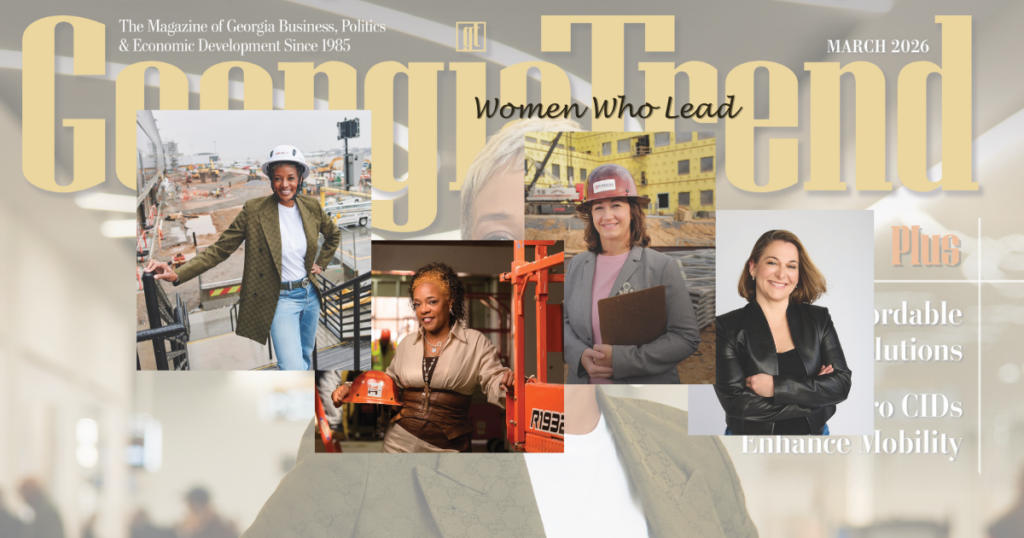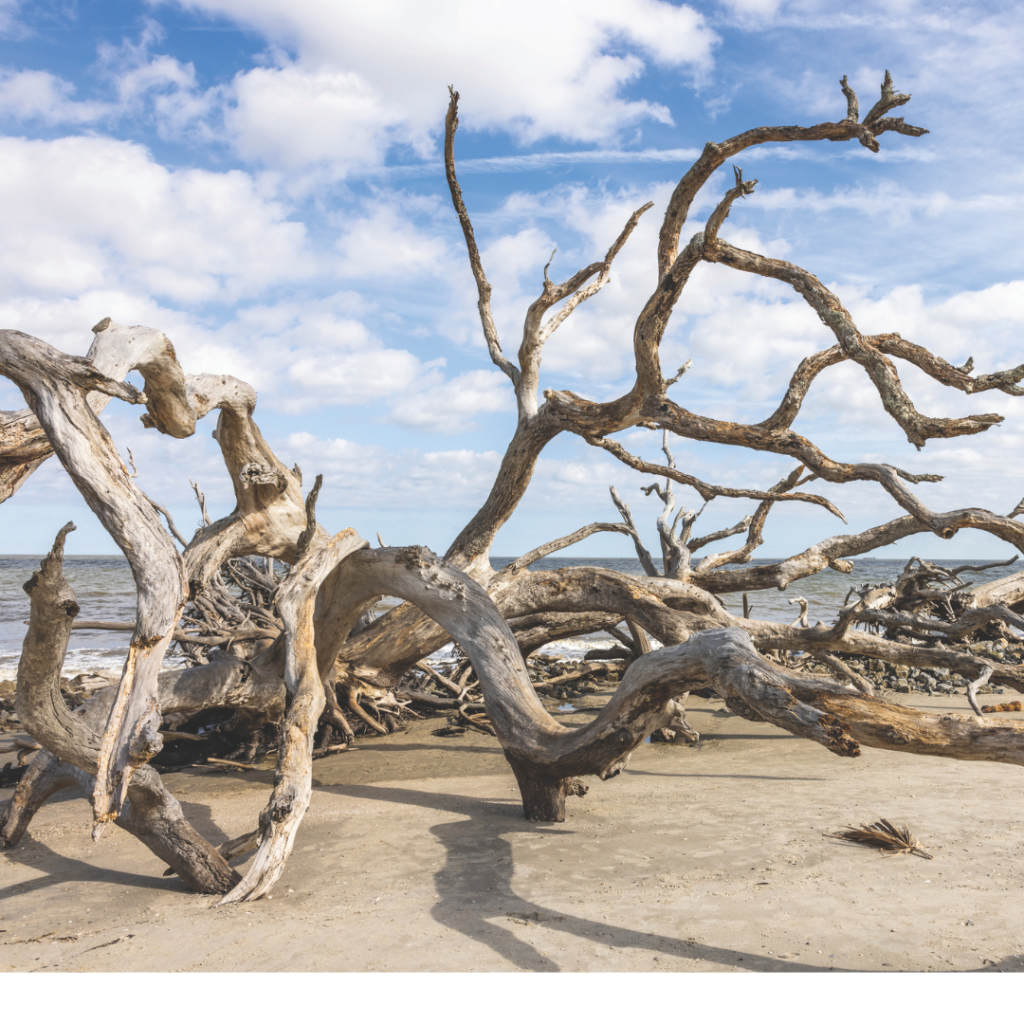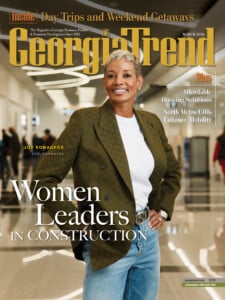2024 Georgian of the Year | Ed Bastian, CEO, Delta Air Lines
With Flying Colors
Just over three years from the time in March 2020 when COVID-19 brought Georgia’s Delta Air Lines – and much of the U.S. economy – to its knees, the moment came last fall when the airline announced its third-quarter 2023 financial results: a whopping $1.11 billion in profits, up from $869 million the same quarter the previous year, and record operating revenues of $15.5 billion, ahead of Wall Street estimates. Ticket sales were strong and increased passenger-carrying capacity helped offset fuel and labor costs. It was a remarkable milestone in Delta’s turnaround, and the company projected a solid fourth quarter as well.
Between disaster and recovery, though, was much uncertainty, plenty of hard work and textbook leadership from CEO Ed Bastian and his team.
“COVID was easily the most difficult challenge we’d ever faced as a company in the 100-year-old history of Delta,” Bastian says. “It was something we weren’t prepared for – no one had any warning. There was no playbook, nothing you could lean on to give you guidance. It tested our character. But we learned a lot about ourselves and a lot about our company. It passed the test with flying colors.”
For his leadership of the company that is a global player and key driver of the state’s economy, Bastian is Georgia Trend’s 2024 Georgian of the Year.

Widely Honored: Bastian (right) accepting Chief Executive Magazine’s 2023 CEO of the Year award at a gala in New York City, with Salesforce CEO and Co-founder Marc Benioff, photo Ben Hider.
The rosy third-quarter financial results, he says, “are a great testimony to the hard work of our team. [With] all that we’ve been through these last several years, to be able to return the company back to profitability is really important on multiple levels. It gives us better resources to reinvest back in the company. It also helps contribute to something unique at Delta – our employee profit-sharing, where our employees receive 15% of the profits.” The third quarter added $417 million to next year’s expected profit-sharing payments and brought the year-to-date number to more than $1 billion.
The Airline and the CEO

Company Man: Bastian (center) visiting with customer service employees at Atlanta’s Hartsfield-Jackson International Airport in 2015, photo contributed.
Delta, which will celebrate the 100th anniversary of its founding in 2025, is one of the world’s largest airlines – the largest by revenue and asset value, second largest by fleet size and third largest by number of passengers carried. From its beginnings in Macon as an aerial crop-dusting business, the airline has grown steadily. Today it has about 100,000 employees, about 34,000 of them based in Georgia.
Delta’s growth has powered the prominence of its home base, Atlanta’s Hartsfield-Jackson International Airport (the world’s busiest), and consequently it fuels much of Georgia’s economic development. It’s hard to find a CEO who has expanded operations within the state or relocated a business here who does not credit the airport as a
major draw.
Both the airline and its CEO have been widely honored. In 2023, Bastian received the prestigious Four Pillar Award, given by Atlanta’s Council for Quality Growth, and was named Ethical Leader of the Year by the Society for Human Resource Management and Chief Executive of the Year by Chief Executive Magazine.

Showing Gratitude: Bastian unveiling a plane featuring more than 90,000 employee names forming the words “thank you” on the company’s profit-sharing day in 2020. Delta paid out $1.6 billion that day to eligible employees, setting a record for a U.S.-based company, photo Chris Rank.
Delta was ranked the No.1 airline in the country by the Wall Street Journal in 2022 and by readers of Condé Nast Traveler and USA Today in 2023. TIME ranked it No. 12 on its 2023 list of the world’s best companies, and Forbes rated it No. 13 on its list of best companies for women. Newsweek recognized it as one of America’s best places for LGBTQ workers.
Such recognition is deeply rewarding, Bastian says. “It’s very humbling to receive those honors, honors that come from people that know and look up to Delta for its leadership.” When the awards are given to him personally, “I always assert that I am accepting for our entire company.”
Bastian, 66, a native New Yorker and graduate of St. Bonaventure University, is a numbers guy by training. He has been with Delta for 25 years – the last seven as CEO. Prior to that he was controller, CFO and then president; he had earlier stints at Price Waterhouse, Frito-Lay and Pepsi.
His Delta tenure hasn’t always been easy, but he seems to relish the tough times as well as the good ones. “I’ve loved my career here,” he says. “I’ve had an opportunity to see the company grow three-fold. I’ve seen the company respond to crises – the pandemic was just one of them. I was here for 9/11. I was here when we were forced to file for bankruptcy protection in 2005, [here for] the recession in 2008 and the merger with Northwest [Airlines] in 2010. It’s been an interesting time. Through it all, Delta came out stronger.”
The COVID Effect
In February 2020, Delta was flying high. Its numbers were looking good and employees were about to get the first of their profit-sharing checks, reflecting the previous year’s success. In March the bottom fell out, as COVID-19 morphed into a global threat, spreading quickly and relentlessly from Asia to Europe and the United States. Schools shut down, businesses closed, supply chains were disrupted and much of the populace sheltered in place. Fear gripped the nation and the world. Air travel sputtered and all but ground to a halt amid travel bans – with no certainty about when it might pick up again.
“We are a values-based organization, and when you lead a company, there are times when you see something going on in the world around you or in your community that feels counter to the values you support, and you see individuals feeling the pain, harmed [by what’s going on], you feel compelled to speak.” Ed Bastian
Delta found itself dealing with an unprecedented number of cancellations and processing customer refunds. In less than a week, the airline’s per-day revenues dropped into negative territory. Delta “parked” over 550 of its planes.

Distinguished Honor: Bastian accepting the Four Pillar award in Atlanta from the Council for Quality Growth, pictured with various speakers from the evening, including his brother Daniel who is standing next to him.
Now that the world is pretty much back to normal and air travel is again strong, it’s easy to forget just how uncharted the territory was that airlines had to navigate. When COVID hit, they had to figure out how to manage through the crisis, without knowing how long it would last.
Bastian recalls the words of Delta Board Chair Frank Blake, former CEO at The Home Depot. “He said, ‘Crises don’t build character; crises reveal character.’ He knew the character of our people, our franchise, and he was confident we were going to have the capability to manage through it, to get to the other side as successfully as anyone could.”
A Delta-produced documentary, The Steepest Climb, chronicles the airline’s struggles and strategies from the onset of the crisis to the conclusion.
“It was also a time of protecting each other,” Bastian says of the crisis, “protecting our customers, protecting our franchise, our resources. It was also about protecting our future. It was very easy with the pandemic [to] forget about anything but the virus and [you] had to keep in mind, top of mind, that you were going to get through this, and you wanted to be ready when that time comes. That’s why we insisted that we didn’t furlough anyone,” as the airline had done post-9/11. “We wanted to be ready when the time came to return to service. We wanted to make certain that our future was not going to be dimmed by this pandemic. If anything, we were going to get better for having been through it. It was really an incredible period of time.”
In lieu of furloughs, Delta offered early retirement to some employees and gave others the option to take four-month unpaid leaves of absence.
As flights resumed, Delta was early in requiring passengers to wear masks and initiated a policy of keeping middle seats empty to allow safe breathing room. The company also increased its cargo business to aid in shipping more materials, including pharmaceuticals and supplies. “I was really proud of how our people responded,” Bastian says. “I trust and hope that we’ll never have to experience that ever again.”
Ongoing Challenges
Even with COVID-19 mostly in the rear-view mirror, Bastian says the airline world is still wrestling with making sure capabilities are at full strength. For instance, the roughly 20,000 Delta employees who retired had to be replaced, and other positions still had to be filled. (Last fall the company laid off some corporate and management employees but said no frontline personnel would be affected.)
“One challenge is making sure new employees have not just the level of technical proficiency but the cultural sensitivity and awareness of who we are. I like to remind our people that Delta is not just another airline. It’s Delta Air Lines. There’s a level of pride, responsibility, accountability,” Bastian says.
Global crises affect and involve Delta – most recently, the Israel-Hamas war. Bastian says such a tragic conflict “causes you to want to lean in and do whatever you can.” For Delta, that meant helping evacuate people, many of them Americans, to places of safety – often working with El-Al, the Israeli airline, and with the U.S. State Department. Early on, Delta ceased flights to Tel Aviv.
Looking toward the airline’s next century, Bastian sees major growth opportunities in the international market. Currently, one-third of Delta’s business is international, and two-thirds is domestic. “We are primarily a domestic carrier. In the U.S., the marketplace is pretty well saturated, very well developed.” With no new airports to serve, no new likely routes, the future is international, he says. “Our anthem is that no one better connects the world than Delta.”
Corporate Culture
Delta prides itself on taking care of its people first, Bastian has often said, so they will take care of customers. That sentiment is crucial to the airline’s identity.
“We’re a service business,” he says. “One thing we know about our business is that there are many things that can be copied. We all fly many of the same planes, go to many of the same destinations, buy our fuel from many of the same sources. The only things that cannot be replicated in the airline industry are our people and the culture of the company that is unique.”
He considers it his main mission and responsibility to make sure employees have the tools and support they need, “and let them lead from the front. It’s a service model that resonates well. It’s aways about people, about service. You have to trust your people to make the very best decisions. They have customers’ backs, and I have their backs.”

Crisis Management: Bastian visiting with flight attendants at an employee break room in Salt Lake City during the COVID-19 pandemic, photo contributed.
This guiding tenet has led the company to make itself heard on matters important to its employees, among them voting rights and LGBTQ concerns. The airline was publicly critical of provisions in Georgia’s Election Integrity Act of 2021, which made changes to absentee voting and restricted the use of ballot drop boxes; opponents believed the changes could make voting harder for many minority voters. Prior to that, Delta joined other top Georgia companies in speaking out against a so-called religious liberty measure that discriminated against the LGBTQ community; it was ultimately vetoed by then-Gov. Nathan Deal.
In the wake of the 2018 shooting at Marjory Stoneman Douglas High School in Parkland, Florida, Bastian ended Delta’s discount program for NRA members. State lawmakers retaliated by passing legislation that killed some tax exemptions on jet fuel Delta uses. Bastian said at the time, “Our values are not for sale.”
“COVID was easily the most difficult challenge we’d ever faced as a company in the 100-year-old history of Delta.” Ed Bastian
Of Delta, he says, “We are a values-based organization, and when you lead a company, there are times when you see something going on in the world around you or in your community that feels counter to the values you support, and you see individuals feeling the pain, harmed [by what’s going on], you feel compelled to speak.”
Those decisions to speak out are not lightly considered. “You’re not trying to put yourself ahead of the issue or become a politician or social activist,” he says. Balancing the company’s vocal support of significant issues with its bottom line can be hard. “That’s why, in my opinion, we always have to be very careful about when we choose to speak. We know when we speak, given how divided we are, probably half the people disagree [with us]. We’re in business. We want everyone to like Delta.”

Protecting Customers: Delta required passengers to wear masks, provided hand sanitizing stations and kept the middle airplane seats empty during the height of the pandemic, photo contributed.
Diversity is a Delta priority – not surprising, since the airline serves destinations throughout the world – and one that was re-examined and reinforced, somewhat painfully, early in the pandemic, when some employees let the company know that its efforts were falling short in certain areas. Bastian and his team sought input from those employees, and the company has redoubled its commitment to diversity, he says.
“At the highest level, diversity is something that by definition means you surround yourself with people who are different from you,” Bastian says. “Unfortunately, politics [has] gotten into diversity efforts in a negative way. Diversity, at its core, means you are stronger and you’re smarter. You’re different – you have different perspectives, [but] you learn from each other. So anyone who wants to be in a leading role has to make sure your team really understands that diversity, while it is clearly the right thing to do, is also the smart thing to do.”
The Delta CEO is fully aware that even during good times, there are always challenges ahead. “In the airline industry, there is no such thing as a normal day,” Bastian says. But he is clearly bolstered by the rewards of the work he does and says simply, “It’s a labor of love.”







